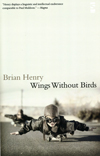Wings Without Birds
Wings Without Birds, the most recent collection from poet and translator, Brian Henry, is a book that quietly and confidently upends various conventions and expectations. The title itself is a good map for what follows: the mind at flight, tethered but not subservient to the earthly body. Although the speaker in “Where We Stand Now,” the book’s long center poem, claims:
Wings Without Birds, the most recent collection from poet and translator, Brian Henry, is a book that quietly and confidently upends various conventions and expectations. The title itself is a good map for what follows: the mind at flight, tethered but not subservient to the earthly body. Although the speaker in “Where We Stand Now,” the book’s long center poem, claims:
The body, my body, is what
I think about most. Even in my sleep
I think about thebodymybody.
How it disappoints in every way.
the poems themselves gracefully move beyond the borders of the body in intuitive leaps and associative imagery.
At times, Henry plays with spatial conventions – his use of white space in the opening (“Epithalamium”) and closing (“Sometimes”) poems bookend the collection neatly, giving us the sense of expansiveness and movement that the title promises, a pure flight conveyed in moments like:
swallows
cicada swift
storm pizzicato
red
sometimes
red
(from “Sometimes”)
More frequently, however, Henry is less sparse and fills in those spaces. “Where We Stand Now,” the strongest poem in this collection, is a pleasantly lengthy ramble full of both meta-commentary on the act of writing this particular poem (“If I call this poem a journal / does that settle anything? make / anything less or more clear?” and “Crack this poem open and you will see / me seated with headphones on”) and on reading (“All reading is mis-reading.”), yet which remains firmly planted in the actual world of visiting New York, Yo La Tengo concerts, and not waking the baby. If it is true that, in the end, as Henry posits, “We all live in the mind,” then his, with all its constant grappling with the awkwardness of being human, wry flashes of wit, and sudden sharp imagery, is certainly a pleasant companion.





